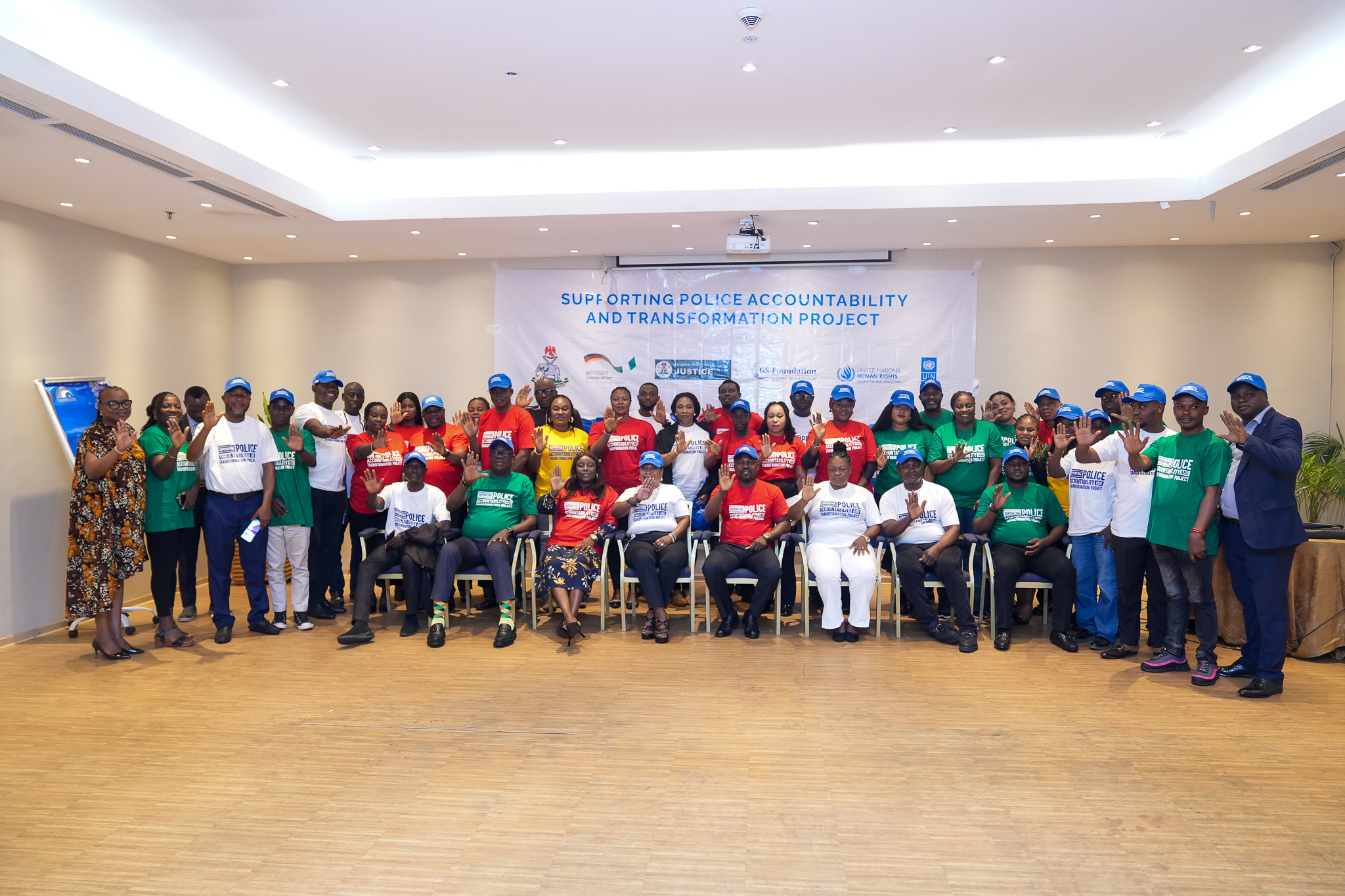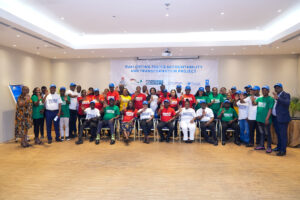
Strengthening Legal Capacity in Gender-Based Violence and Garnishee Proceedings: A Step Towards Gender-Responsive Police Accountability in Nigeria
- Gender
- No Comment
- 18

Gender-based violence is a major problem in Nigeria, with 27,698 cases of SGBV reported between 2020 and 2023 (Gazette Nigeria). However, prosecution rates remain low due to gaps in investigative competency and legal knowledge among law enforcement practitioners.
The United Nations Development Programme (UNDP) recognizes that equal access to justice is fundamental to the protection of human rights, especially for survivors of sexual and gender-based violence (SGBV). The Nigeria Police Force and the Ministry of Justice play pivotal roles in ensuring that survivors receive justice and that perpetrators are held accountable. To effectively address SGBV, there is a need for continuous legal and procedural capacity building, improved coordination among justice stakeholders, and a survivor-centred approach that upholds survivors’ dignity and rights.
UNDP conducted a four-day training workshop on SGBV and Garnishee Orders in Lagos from 16 to 20 March 2025. The event brought together 48 key stakeholders, actors from the justice sector, including legal officers, police prosecutors, and judicial officials, to strengthen their prosecutorial skills in SGBV cases and improve enforcement of Garnishee proceedings. UNDP implemented this activity in partnership with the Federal Ministry of Justice, the Police Service Commission, the Global Security-Sector-Reform Foundation (GS-Foundation), and the Office of the United Nations High Commissioner for Human Rights (OHCHR).
UNDP held this training event under the Supporting Police Accountability and Transformation (SPAAT) Project which is implemented with generous funding from the Federal Government of Germany and in partnership with GS-Foundation and the Nigeria Police Force. The training aimed to address critical systemic gaps by imparting participants with practical skills and tools to improve case management, investigative techniques, and adherence to legal frameworks. The training was delivered by a diverse faculty, including UNDP’s Senior Gender Consultant, a Senior Advocate of Nigeria, a Gender activist, a High Court Judge, and a Chief Magistrate The workshop used interactive methodologies and real-time case studies to ensure maximum engagement and practical application.
Key outcomes of the training:
- Bridging institutional gaps: The training fostered collaboration between the Bar and Bench, facilitating a rare opportunity for legal practitioners, including senior lawyers, to mentor and exchange insights with their junior counterparts in a non-adversarial setting.
- Strengthening prosecutorial coordination: A critical breakthrough was the establishment of stronger professional relationships between government prosecutors and police prosecutors—previously a major bottleneck in expediting cases and securing successful prosecutions.
- Knowledge exchange and networking: Participants engaged in cross-sectoral dialogue, shared best practices, and established a professional network, further reinforced by the creation of a WhatsApp group to sustain collaboration beyond the training.
- Advancing Institutional Reforms: The workshop not only improved technical competencies but also laid the groundwork for a structured approach to aligning police practices with human rights principles and legal standards.
The project focuses on making the Nigeria Police Force (NPF) more professional, human rights-compliant, and accountable to the Nigerian public.
UNDP Nigeria
The Supporting Police Accountability and Transformation (SPAAT) project is implemented under the UNDP Nigeria Governance, Peace, Security Portfolio.
The Supporting Police Accountability and Transformation (SPAaT) Project, running from June 1, 2024, to December 31, 2025, represents the third phase of Nigeria’s ongoing police reform efforts. Funded by the German Federal Foreign Office and implemented by UNDP in partnership with GS-Foundation. The project focuses on making the Nigeria Police Force (NPF) more professional, human rights-compliant, and accountable to the Nigerian public.
Closing the gaps in Garnishee Proceedings
Beyond SGBV prosecution, the SPAaT Project also tackles the ineffective enforcement of Garnishee proceedings, which has long undermined the administration of financial justice in Nigeria. When a court orders a debtor’s funds to be seized and paid to a creditor, the enforcement process should be swift and straightforward. Yet, in practice, delays, administrative errors, and lack of procedural knowledge often render many of these judgments meaningless. To address these gaps, the capacity-strengthening programme equipped NPF legal officers with a better understanding of:
- The legal foundations of Garnishee proceedings to ensure compliance with court directives.
- Case management techniques for efficient application and enforcement of financial judgments.
- Ethical considerations to prevent corruption and misuse of the system.
The Supporting Police Accountability and Transformation (SPAAT) project is implemented under the UNDP Nigeria Governance, Peace, Security Portfolio.
UNDP Nigeria
A collaborative effort for sustainable reform
This programme is part of a broader commitment under SPAaT to professionalize the Nigeria Police Force, ensuring that officers are well-trained in legal processes that directly affect justice, human rights, and public trust. By focusing on both SGBV prosecution and garnishee proceedings, the programme contributes to:
- Stronger legal enforcement for financial judgments and crime prosecution.
- Higher conviction rates for perpetrators of SGBV.
- Increased public confidence in the police and judicial system.
Through sustained collaboration between the SPAaT Project, international development partners, government agencies, and civil society organizations, Nigeria is moving towards a more transparent, responsive, and human rights-compliant justice system.
In a world where justice often feels out of reach, these reforms are closing critical gaps and ensuring that law enforcement officers are not just gatekeepers of justice, but active facilitators of it.
UNDP supports countries to tackle complex development challenges and achieve the 2030 Agenda for Sustainable Development. Central to this agenda is Sustainable Development Goal 16 (SDG 16), which promotes good governance, peace, security, and justice as critical enablers for the achievement of all other SDGs. In alignment with this goal, UNDP supports governments and their institutions to better deliver quality, fair, accountable, and accessible justice and security services for all people, and especially those most at risk of being left behind, as foundational elements of a peaceful, just, and inclusive society for sustainable development.
UNDP Nigeria is committed to supporting the government of the Federal Republic of Nigeria in driving transformative change towards achievement of the Agenda 2030 goals. The UNDP Supporting Police Accountability and Transformation project (June 2024-December 2025) specifically contributes to the government’s long-term efforts, aligned to SDG 16 (Peace, Justice and Strong Institutions) and SDG 5 (gender equality), to transform the Nigeria Police Force (NPF) into an effective, trustworthy, accountable, and professional police service that is trusted by and responsive to the needs of the Nigerian people, including women and other vulnerable and marginalised groups, in accordance with human rights standards and the rule of law.
UNDP partners with the government of Nigeria to realise the commitments under the Agenda 2030 and its sustainable development goals, especially SDG16 and SDG5, the African Union Agenda 2063 and the Nigeria National Development Plan (2021-2025), and in line with the UN Sustainable Development Cooperation Framework (2023-2027) and UNDP Country Programme Document (2023-2027).
https://www.undp.org/nigeria/blog/strengthening-legal-capacity-gender-based-violence-and-garnishee-proceedings-step-towards-gender-responsive-police-accountability




